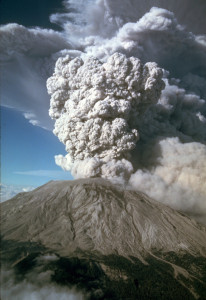 Since we were first together, Larry and I have read to each other–over breakfast, while making dinner, or just when something good struck the eye. This morning, we were both reading different articles by Peggy Noonan. I read him this, from her article about learning her craft in the Wall Street Journal:
Since we were first together, Larry and I have read to each other–over breakfast, while making dinner, or just when something good struck the eye. This morning, we were both reading different articles by Peggy Noonan. I read him this, from her article about learning her craft in the Wall Street Journal:
“In 1980, the Mount St. Helens volcano in Washington state erupted. It really blew, with an eruption plume that was 15 miles high; it spread ash along a dozen states. It was my job, over those days, to call everyone I could think of nearby or in surrounding towns to do audiotape interviews about what they had seen, experienced, and what was the latest.
 One morning, a week or so into the story, I tracked down a guy who knew what was going on near the volcano…he told me that the biggest problem right now was the long lines at the post office. Everyone in town was picking up volcanic ash and putting it in envelopes and mailing it to their friends. The ash was slipping out of the envelopes and clogging the machines. I found this comic and lovely—how do we respond to disasters? we get mementos!—but I thought it insufficiently serious for a sober network news broadcast, so I didn’t give it to my editor to use.
One morning, a week or so into the story, I tracked down a guy who knew what was going on near the volcano…he told me that the biggest problem right now was the long lines at the post office. Everyone in town was picking up volcanic ash and putting it in envelopes and mailing it to their friends. The ash was slipping out of the envelopes and clogging the machines. I found this comic and lovely—how do we respond to disasters? we get mementos!—but I thought it insufficiently serious for a sober network news broadcast, so I didn’t give it to my editor to use.
…I mentioned it to our morning anchor, a young man named Charles Osgood, who was famous for writing the news with cleverness and wit. The minute that I told him about the post office, Charlie’s ears perked up. Put that on top, he said.
I was startled. I thought it was just a little story that would be interesting to us. But he knew that something interesting to us is likely to be interesting to everyone. And though it was a small anecdote, it said a lot about the mood around Mount St. Helens: It tells us the emergency is over and human nature has kicked in.”
And this:
“For many years I had been a writer who wrote most comfortably for the eye. I had spent three years in college writing features and editorials for the student newspaper, and naturally wrote for readers. But the old men in the newsroom had made their careers writing for listeners, for people absorbing information not through the eye but the ear. They knew how to write words in the air, which is different from words on the page…
To me they were ancient—56! 64! Some were no longer considered at the top of their game, some hadn’t succeeded at TV, some had never wanted to leave radio. I was getting the last of them. ”
He read me this, about Hilary’s Benghazi testimony (Interesting that we call her Hilary, while everyone else is Biden or Sanders or even Clinton!):
 “She took her seat in the hearing room handsomely coiffed, beautifully made up, wearing a sober, dark high-end pantsuit. Young journalists tell me I’m not allowed to describe how she’s dressed or whether she looks tired (no, well-rested) or stressed (no, cool as a cucumber). I tell them if they’re going to be journalists they can’t start out as word cops. Nor should they in their work put politically correct limits on their ability to describe a scene. If you mean to be a craftsman, you cannot start your career as a censor.”
“She took her seat in the hearing room handsomely coiffed, beautifully made up, wearing a sober, dark high-end pantsuit. Young journalists tell me I’m not allowed to describe how she’s dressed or whether she looks tired (no, well-rested) or stressed (no, cool as a cucumber). I tell them if they’re going to be journalists they can’t start out as word cops. Nor should they in their work put politically correct limits on their ability to describe a scene. If you mean to be a craftsman, you cannot start your career as a censor.”
Now it’s just as if you had breakfast with us, expect no eggs.